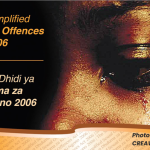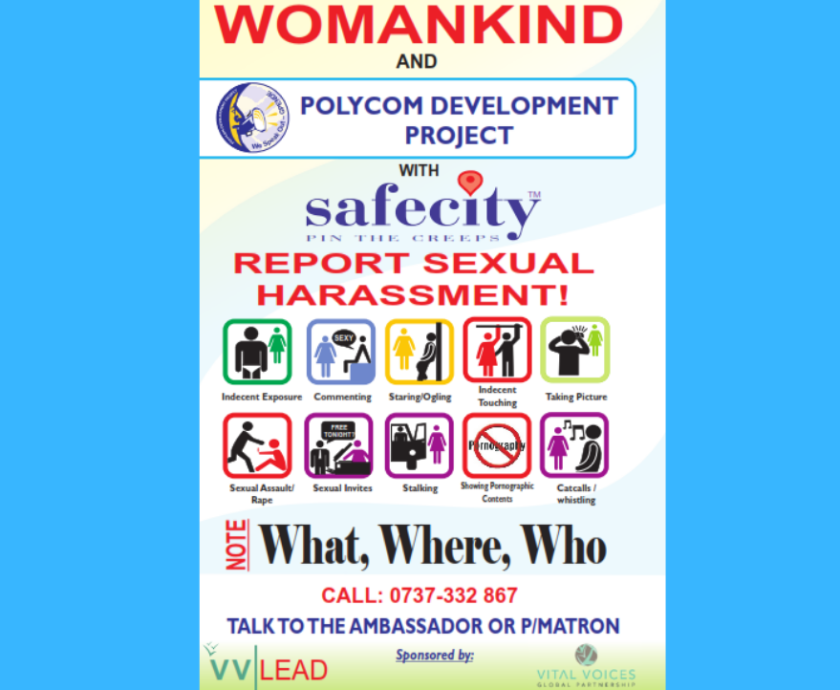Brenda Kalekye, a former student of Soda Academy in Kibra slum, is a proud beneficiary of the ‘Talking boxes project’ by Polycom Development. Her studies were fully funded by the project after she revealed in the ‘Talking box’ in her school back then, that she was struggling with school fees and would soon drop out.
“When the ‘Talking box project’ was introduced in my school so many years ago, we were told that it is a safe space to share our problems. True to it, I shared my problem and within 2 weeks a solution was found,” said Brenda.
The 22-year-old who has now delved into business, says she would not have completed her studies, should she not have interacted with the project.
“I was in class 7 and I was really struggling. Before being introduced to the project, I had decided to drop out of school to look for a job in order to make ends meet. The project sponsored both my primary and high school education,” said Brenda.
Brenda who is now a mentor in the project says her story is not unique to the many stories she now sees when reviewing the letters in the talking boxes.
“I decided to give back to the project that saved my life and I encourage young girls to share their problems through the project because a problem shared is a problem half solved,” said Brenda.
She is just one among hundreds if not thousands of young boys and girls in Kibra who have benefitted from the United Nations Population Fund UNFPA supported project.
How it works
Polycom Development Project a non-governmental organization that works towards empowering slum school going boys and girls begun the ‘Talking boxes project’ in 2010 to assist the young adolescents to cope with the challenges of growing up in a slum.
The project that has since expanded to 50 public and private primary schools in Kibra slums encourages the young adolescents to write on a piece of paper any issue touching on violation of their sexual and reproductive rights and put it in a box in their respective schools.
The boxes are then emptied between 1 to 2 weeks by mentors who are young girls drawn from the project and specifically the slum. The issues are then addressed in meetings between Polycom Development and the girls.
The location of the boxes varies from one to school to another but the ultimate decision on where the boxes are placed lies fully with the adolescents.
This is, the NGO says, helps boosts confidence in the project and allows the boxes to be placed in a location where the girls feel safest.
The keys to the boxes remains with the NGO in order to reduce any interference with adults such as teachers who are sometimes mentioned as perpetrators in sexual abuse cases.
“This year, in the 1st quarter we received a total of 1091 letters, another 1000 letters for the 2nd quarters, 853 letters in 3rd quarter with the 4th quarter is currently ongoing,” said Phenny Ogembo, a mentor at Polycom Development.
Many of the letters address issues such as the need for sanitary towels, incest, attempted rape, defilement cases, sexual harassment, sexual transmitted infections, lack of school fees, food appeals and even family domestic issues.
“We once dealt with a case of a 7-year-old girl who was being defiled by a neighbour with the knowledge of both the mother and the grandmother. It was one of the hardest cases to deal with because both the grandmother and the mother refused to come forth. So we had to remove the girl from that environment and she is doing much better now,” said Phenny.
The Covid-19 pandemic
In July this year, the Ministry of health reported that at least 1 in every 5 adolescents’ girls aged between 15 to 19 years is already a mother or is pregnant making Kenya the third highest in teenage pregnancies.
The rise, according to the report, was attributed to the dire impact of the Covid-19 pandemic and the 7-month school closure that exposed teenage girls to all manner of risks.
Polycom Development Project Co-Founder Evelyn Swilla says the situation was worse in Kibra and this was evident in the magnitude of issues expressed in the talking boxes.
“When schools reopened after the 7 months’ closure during the Pandemic we noticed that many of our girls were really struggling. Cases such as sexual abuse, lack of sanitary towels, exchange of money for sexual favours were rife,” said Swilla.
Swilla says Polycom then resolved to introduce projects such as fighting Covid-19 with hygiene that empowered the girls to make a positive change in the community they live in and also used their referral partners’ system to address dire cases.
“We as an NGO cannot take legal action or perform arrests. So in situations where the girls required rescue, we referred the case to the Children’s department at the D.Os office and see the process through,” said Swilla.
The NGO also organises volleyball tournaments where the girls are invited to attend with their mothers in order to boost positive behaviour change.
“During the tournaments, the girls and their mothers get an avenue to discuss candidly the issues affecting them and strive to find solutions to those problems. It is also a good avenue for the girls to exercise so as to keep fit,” said Phenny.
Ruth Atieno, a parent at Olympics Primary school and an ardent volleyball fun says the tournaments have transformed her relationship with her daughter.
“The tournaments are a great opportunity to bond with our girls. I personally used to struggle with communicating with my teenage daughter but now we get to bond over our love for volleyball. We both enjoy the tournaments very much,” said Ruth.
Sanitary towels
To address the many letters, they receive on lack of sanitary towels, Polycom manufactures and distributes sanitary towels and detergents for washing toilets to schools in the slums of Kibra, Mathare, Mukuru kwa Njenga and Kiambiu.
The process that uses locally available materials through done support, ensures schools are supplied with the much needed commodities.
“Every term we distribute more than 2,000 packets of sanitary towels benefitting 2,500 girls. We also realised that some of the girls are faced with cases of UTIs and we therefore distribute at least 5 litres of detergents per school per term,” said Swilla.
The taking boxes concept is credited for the reduction in cases of teenage pregnancies and the drastic drop of absenteeism among girls during their menses.
A study by the University of Nairobi shows that 56 percent of 13 to 18-year-olds in Kibera have experienced some form of sexual abuse with only 12 percent of those cases being formally reported by the sexual abuse victims.
This publication was produced with the financial support of the European Union. Its contents are the sole responsibility of Zainab Mohammed and do not necessarily reflect the views of the European Union.




